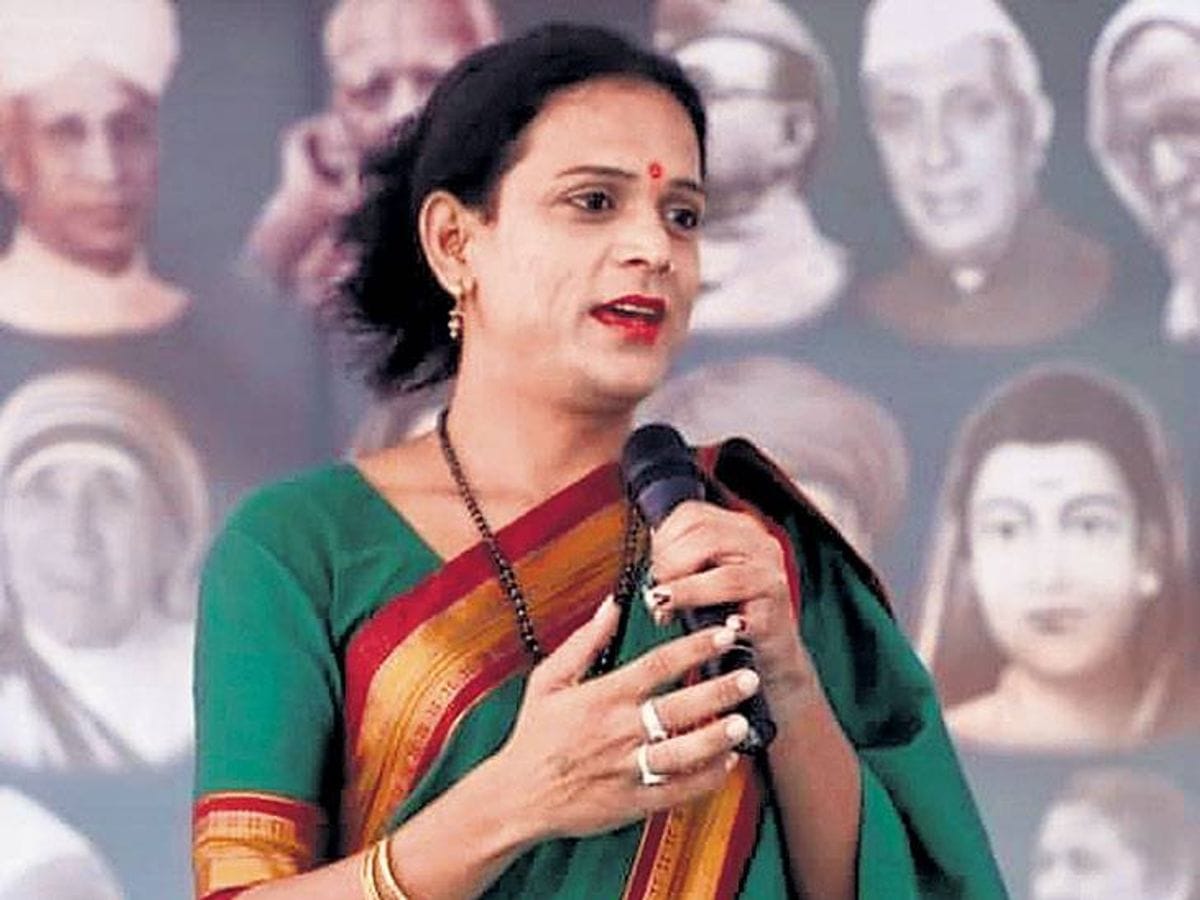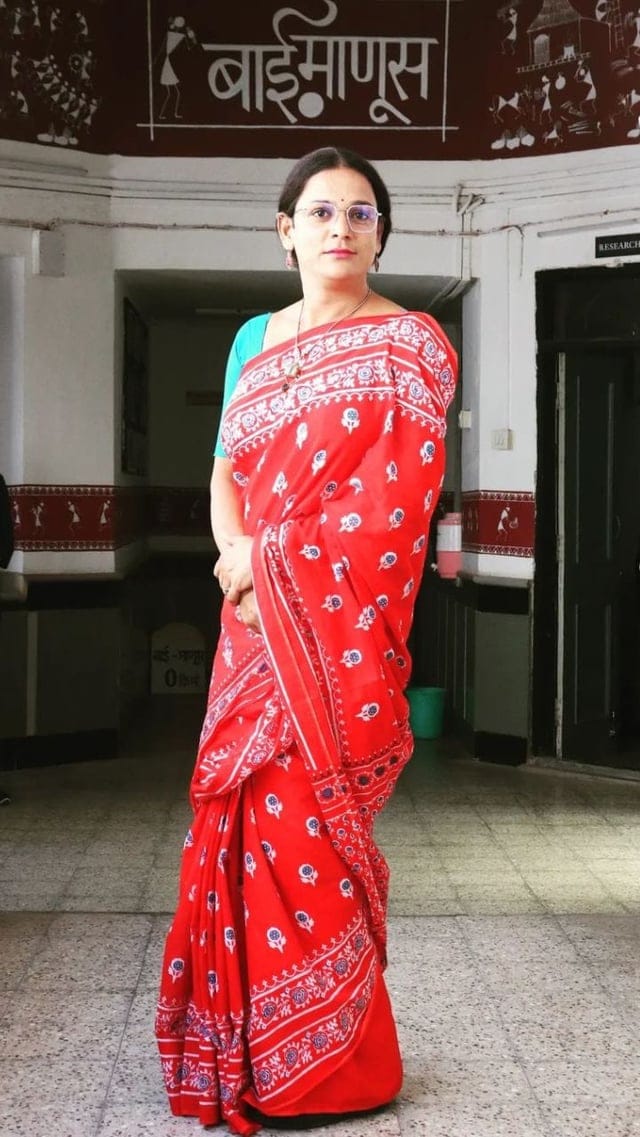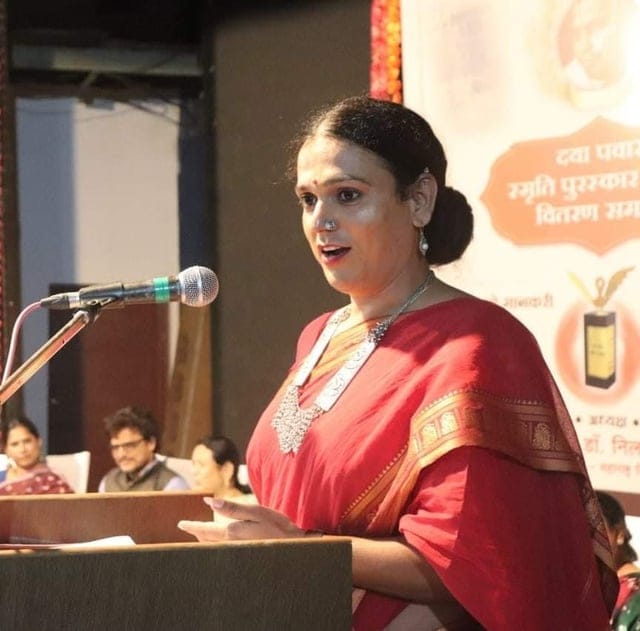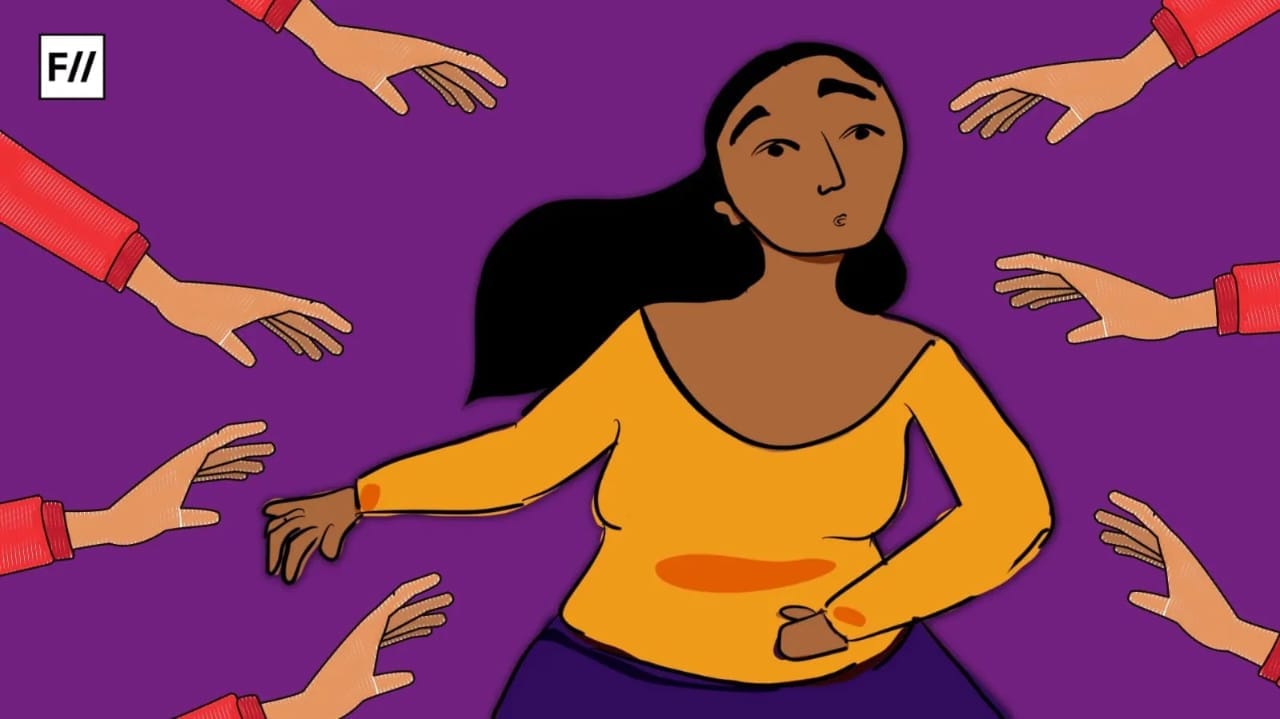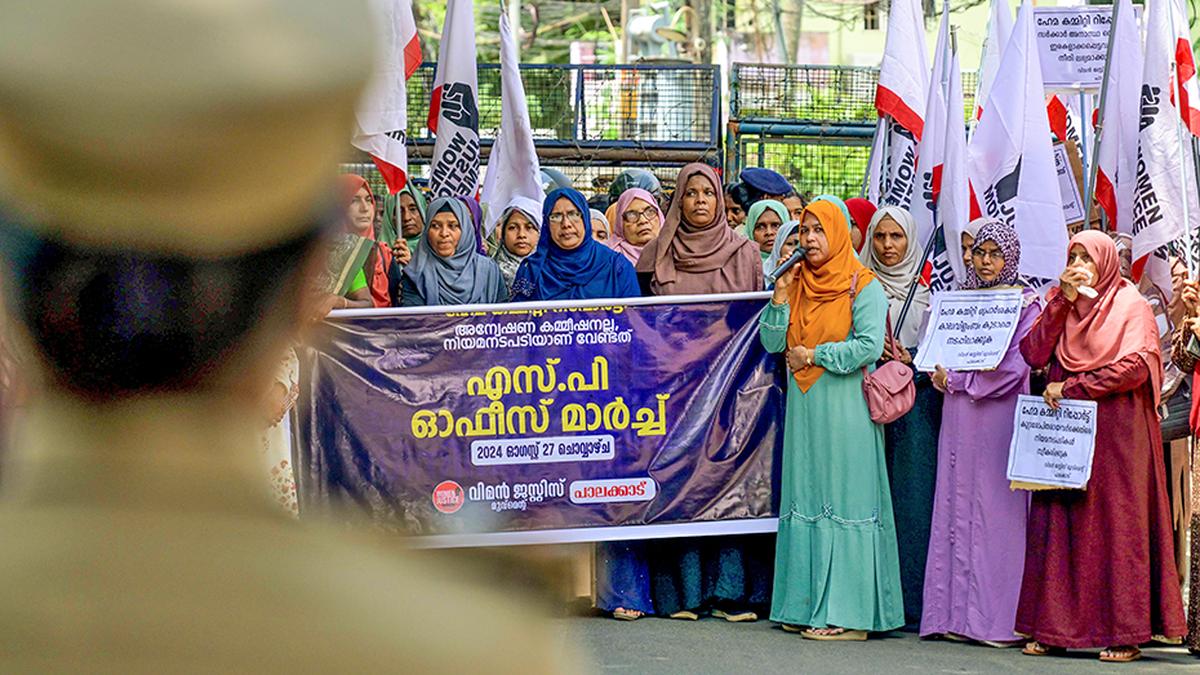A 39-year-old post-graduate in Marathi literature and a visiting faculty at Mumbai’s Tata Institute of Social Sciences (TISS), Shameebha Patil is much more than her gender. She has been a social activist since 2007, a keen learner, a teacher, and a politician with a cause. Her candidature has brought a whiff of new air this election season. Amidst the highly toxic masculine comments, Patil surveyed rural Maharashtra as a beacon for the muted margins of society.
Amidst the highly toxic masculine comments, Patil surveyed rural Maharashtra as a beacon for the muted margins of society.
Vanchit Bahujan Aghadi (VBA) led by Prakash Ambedkar has fielded Maharashtra’s first transgender candidate, Shameebha Patil in the 2024 state elections. Contesting election from Raver, a major banana cultivation region in Jalgaon district, she has taken on 2 patriarchs, Chaudhary Dhananjay Shirish from Indian National Congress, and Amol Haribhau Jawale from Bharatiya Janata Party, two men from influential parties with tall promises but no concrete action to speak for them.
Shameebha Patil is a young woman with a clear vision. Her candidacy is a milestone in the political and social history of India as it is the first time that a transgender person has represented the most vulnerable sections of Indian society. Her nomination represents the queer community and strives to give voice to the most neglected strata politically. ‘In my village, there are only three votes of my community – mine, my guru’s, and my friend’s. So, why would any politician care to ask us for votes? What difference do three votes make to them? Politics of people like me does not matter to any party.’ she says.
Shameebha Patil and the 2024 Maharashtra elections
The 2024 Maharashtra elections were tainted with saffronisation, agenda-driven speeches, and hyper-masculinity being promoted through speeches. Amongst the fight to sit on the throne of this far-right propaganda, women and queer become invisible in their margins. They become objects of welfare and sympathy, but are not considered equals. They become receivers of political aggression, hate, and pity but are never given fair footing.
In numerous rallies organised by rich political parties and stalwart speakers, women become an afterthought and the third gender is intentionally omitted. Fighting with the patriarchal stereotyping head-on, Patil claims that gender has little to do with her political consciousness, ‘I have been working for the people since the time I identified as a man.’ While she asserts that her political conscience is not shifted by her gender, she continues to fight for the marginalised gender: ‘Why is it called the third gender? I have an objection to that. Who decided what gender comes first, second, or third? The patriarchy did.‘
Patil’s election drive is not limited to the issues of the transgender community. She talks about the rights of the plantation farmers, workers, and other minorities who have a history of being systematically sidelined.
Patil’s election drive is not limited to the issues of the transgender community. She talks about the rights of the plantation farmers, workers, and other minorities who have a history of being systematically sidelined. She adopts a door-to-door approach with VBA’s slogan ‘one rupee, one vote‘ asking voters to contribute just one rupee. She claims that since she hails from a humble background, she understands the importance of this campaign. Her targeted voter is not limited to gender, ‘The section of the society that stands with me today is Vanchit (deprived). They are farmers, adivasis, SCs, Muslims, micro-OBCs‘
Patil has brought the issue of women’s health to the fore, a topic that is hushed and hidden under monthly payment schemes. She highlights that her constituency is a rich banana cultivation belt, with more than 1.75 lakh workers, 40 per cent of whom are women. She states that ‘many of these women suffer from back pain and PCOD issues. I have been working to address their health, financial, and social security concerns.‘
Her fight for representation is not just a fight for her gender, it is for the oppressed and neglected. If elected, Patil says she will work for a ‘one percent horizontal reservation for the transgender community‘ along with solving issues of banana farmers, bogus admissions of Adivasis in government jobs, irrigation facilities for all farmers, MSP for crops, due compensation against crop damage, better schools for children, and creation of jobs for Raver’s youth.
Dressed in crisp cotton saris, Patil runs a crowd-funded campaign with a crowd always trailing her wherever she goes. Humbled by the support, Patil dedicates her support to the need for cause-driven politics. ‘First, I am an Ambedkarite. Second, I have always been on the ground. I talk for all communities…I have not paid people to come to my rallies. There are so many aspects of my campaign that are crowd-funded. Such initiatives by people make me proud of what I have achieved so far.‘
Political rallies are generally segregated according to gender. Men are active participants and listeners, welfare schemes and sympathetic tone is reserved for women, and transgender folks are used for a progressive and inclusive appearance. ‘Parties only use transgenders for image building, sentimental value.‘
While almost every manifesto has secured a place for transgender people where so-called measures are promised to make them a part of the mainstream, steps are scattered and implementation is half-hearted.
While almost every manifesto has secured a place for transgender people where so-called measures are promised to make them a part of the mainstream, steps are scattered and implementation is half-hearted.
Some key promises made but left unattended are: reservation for LGBTQIA+ individuals in government jobs and a special scholarship scheme for their education, forming an advisory committee to address the special needs of LGBTQIA+, establishing dedicated health and counselling centres to address the mental health challenges faced by this community, setting up special skill training to create livelihood opportunities, and formulating an inclusive policy for employment to ensure opportunities for and LGBTQIA+ individuals across all sectors.
VBA makes similar promises with an addition of a few like free sex change surgeries in government hospitals, monthly allowance for transgender persons aged 40 and above etc. While political parties talk of streamlining efforts to bring the transgender community to the mainstream, they end up forming portals that aid documentation and identity proof but nothing more.
The National Transgender Portal provides only identity documents. There are no welfare ideas or schemes listed there to bring the transgender people to the mainstream. ‘They act as mere sympathisers and we don’t want sympathisers. I don’t want sympathy and donations, I want empathy and dignity, I want rights and respect.‘ She says.
Is India ready for a queer elected candidate?
On September 6, 2018, the Supreme Court of India decriminalised homosexuality giving a new voice and identity to the queer community. Six years later, the community is still fighting for representation, let alone equality. Shameebha Patil, a social activist and a people’s person, who built her campaign on crowd support lost miserably in the elections. In the November 2024 elections, she managed to garner 8453 votes but remained absent from the mainstream media.
The Maharashtra elections do not decide the fate of the people but question whether India is ready for a queer elected candidate? Do the people vote for hope or in the frenzy of the majority? Do people even read manifestos or just blindly follow the word of the patriarch who announces from the stage gibberish and hate-filled slogans?
Shameebha Patil’s candidature has put a dent in the established patriarchal politics. It has unveiled how the other communities have a voice and are slowly creeping up to the chair. It might take many more elections and many more campaigns, but India will surely welcome a queer candidate on the seat of democracy someday.
